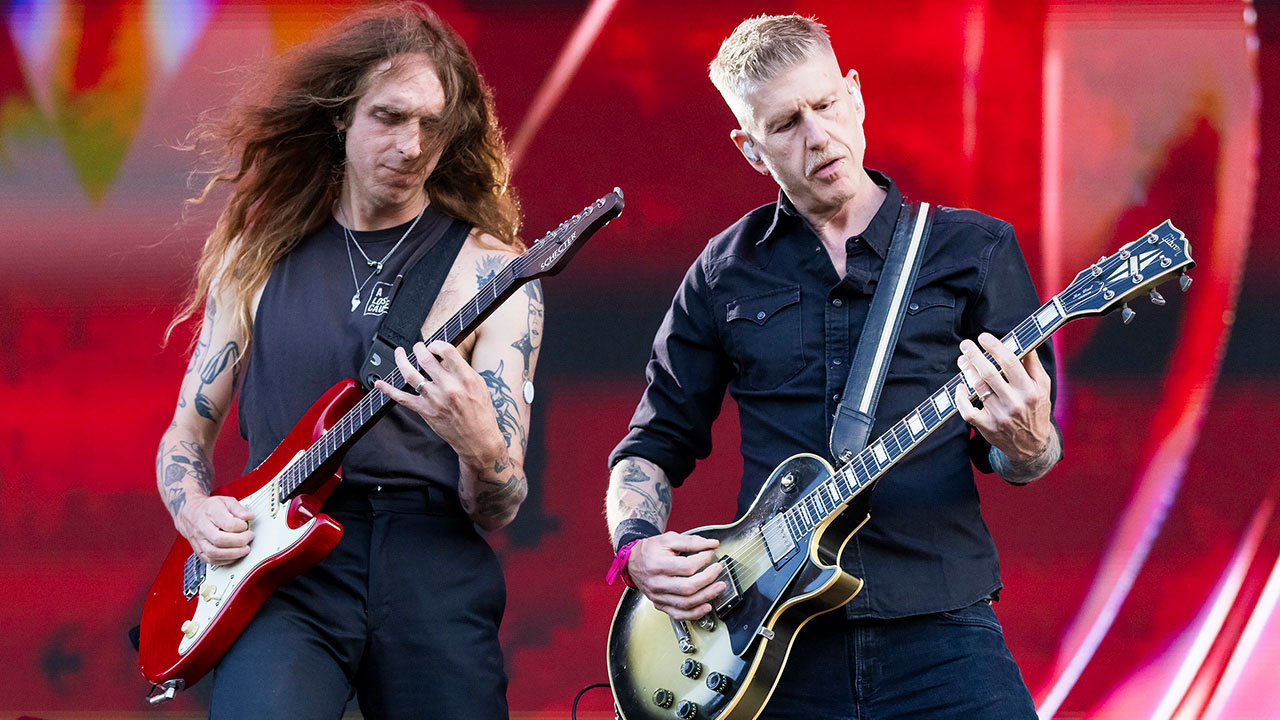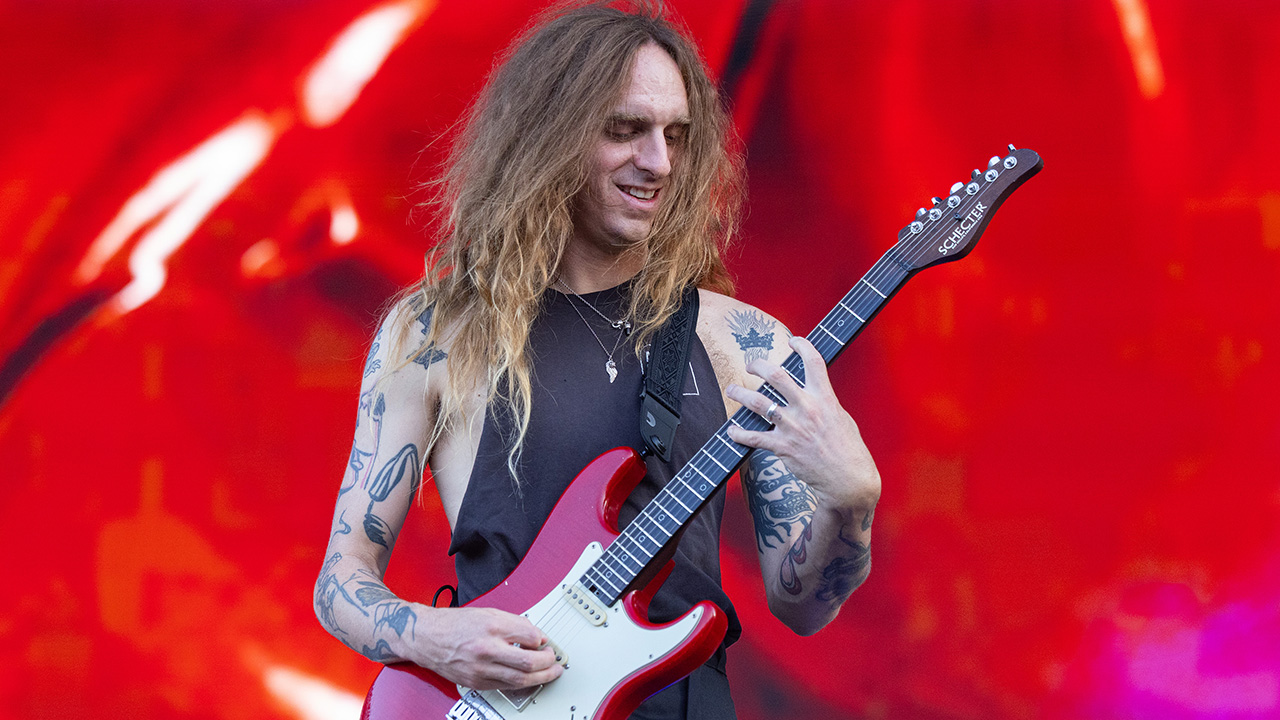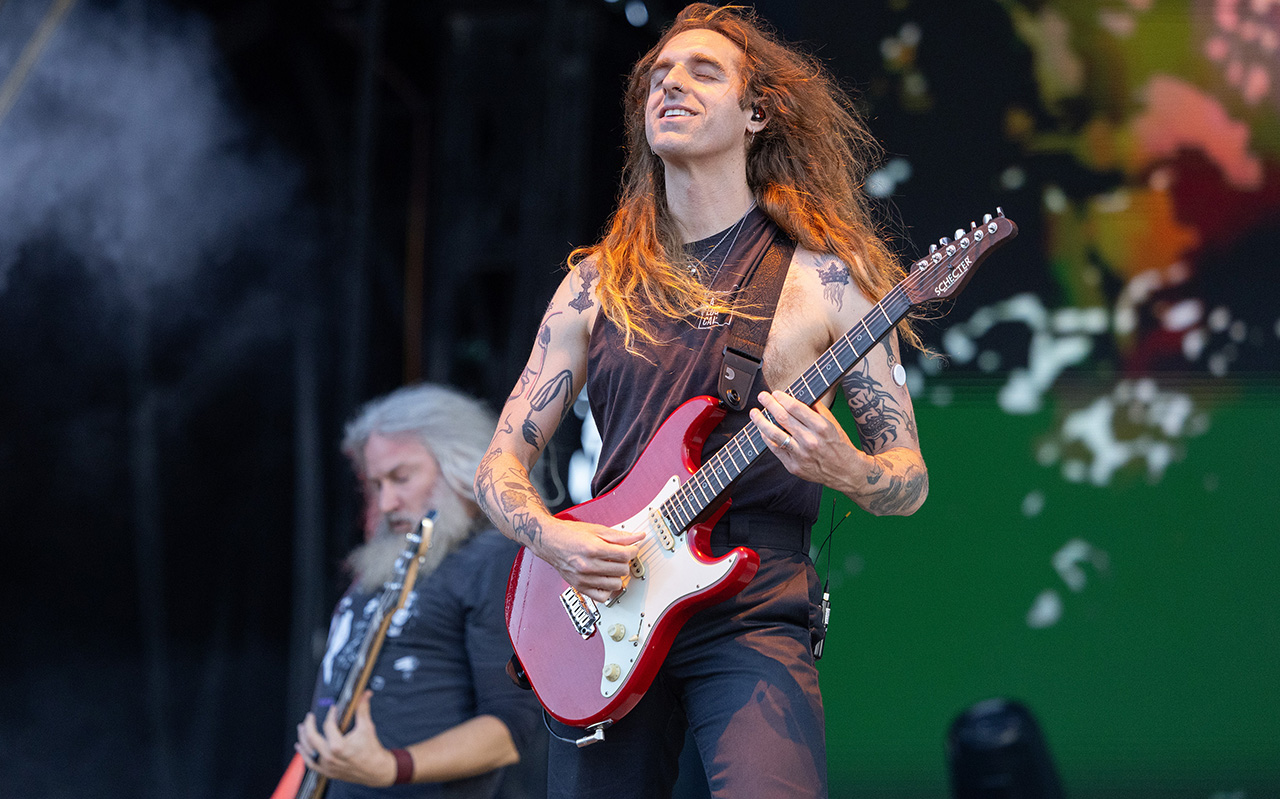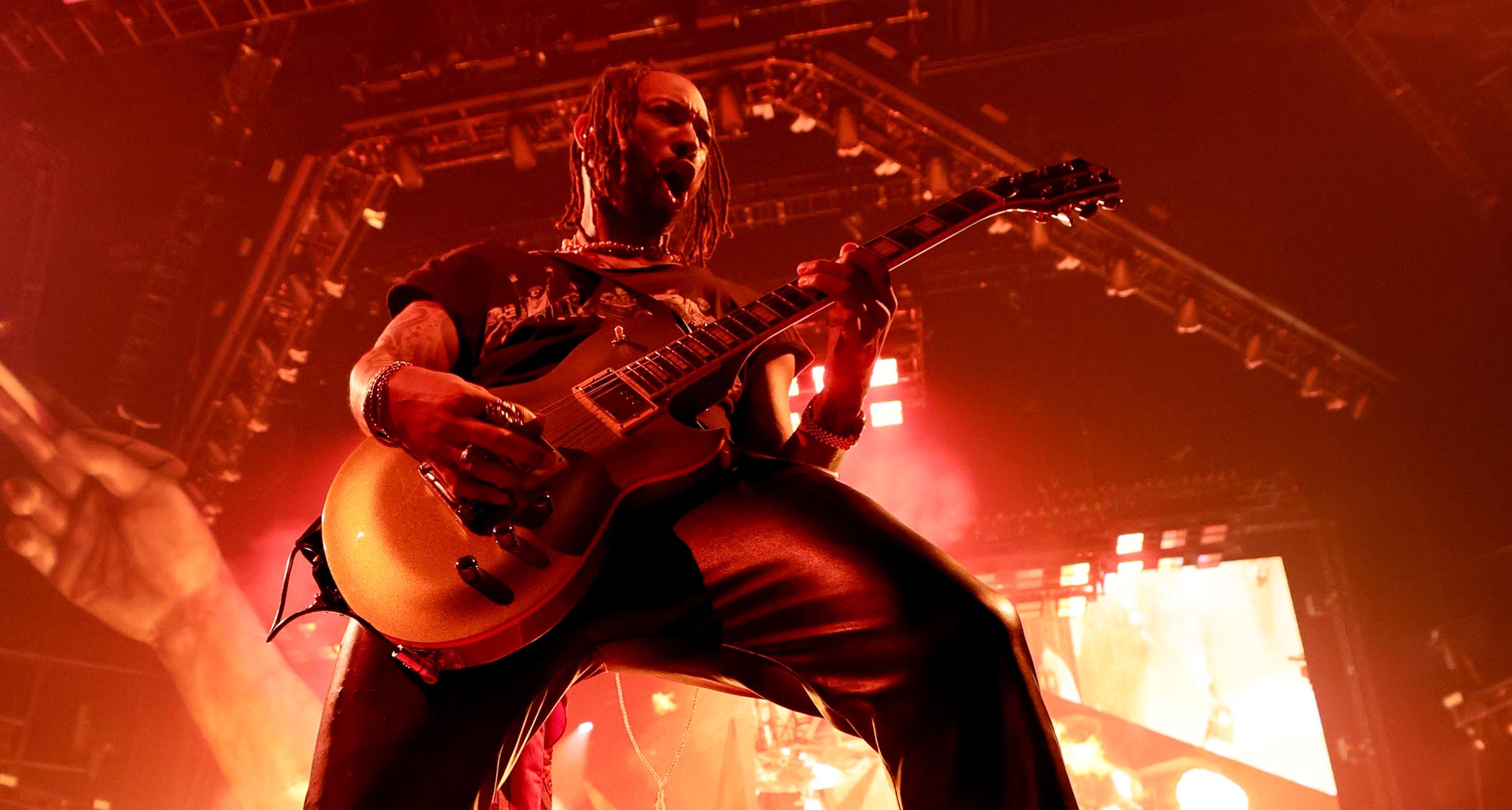“I know I’m being judged right now. I read comments saying, ‘You’ve got nothing on Brent.’ I’m not worrying. I feel free”: How Nick Johnston went from instrumental virtuoso du jour to joining Mastodon and playing Ozzy Osbourne’s final show
The Canadian instrumentalist has taken the leap from small clinics to festival stages in his stride, and thanks to his 10-year relationship with Schecter, he’s got a custom Silverburst to match his new bandmates

All the latest guitar news, interviews, lessons, reviews, deals and more, direct to your inbox!
You are now subscribed
Your newsletter sign-up was successful
Having cemented his name over the past decade as one of the most respected instrumental rock guitarists of his generation, Nick Johnston is someone many Guitar World readers will already be familiar with. And right now the Canadian is buzzing from some of the biggest achievements of his career to date.
He’s just unveiled a line of Schecter signature models commemorating the 10th anniversary of his partnership with the company, bringing key elements of the Custom Shop such as the wenge neck and USA pickups to the more affordable Diamond Series.
He’s also launching a new project with Porcupine Tree/King Crimson drummer Gavin Harrison – their debut full-length Early Mercy has just been released.
But the juiciest development for the legato-loving virtuoso has thrust his name out of the instrumental underground and into the glaring limelight of the mainstream. For the last few months, he’s been living the rock and roll dream after being recruited by prog metal heavyweights Mastodon, after they parted ways with Brent Hinds.
Though YouTuber Ben Eller was drafted to fill in for their performance at Tool’s Live In The Sand festival, Johnston has been stage right for every show since. He now finds himself two tours in, with the general consensus being that he’s a perfect fit.
“It’s turning out to be an unforgettable summer,” smiles Johnston, talking to GW from his home studio on a rare day off in his increasingly busy schedule. “We played to 110,000 people yesterday in Quebec City. After the Sabbath show, I don’t there’s ever going to be anything more intense. It was a proper trial by fire, with the pressure of five million people streaming. Anything after that gig is a bonus!”
Mastodon began their set at Back to the Beginning with fan favorites Black Tongue and Blood And Thunder before serving up an earth-rumbling rendition of Black Sabbath’s Supernaut. It was no ordinary cover either; they enlisted Danny Carey, Mario Duplantier and Eloy Casagrande – three of the most respected drummers in metal – to join in for an all-star jam.
All the latest guitar news, interviews, lessons, reviews, deals and more, direct to your inbox!
For Johnston, the first to admit he’s more used to performing in front of humble audiences at guitar clinics than gracing the world’s biggest stages, July 5th was an absolute whirlwind experience.
“That day was wild,” he says, still in a state of disbelief. “I almost forgot who and where I was for a moment. Supernaut is such a great song. For my solo, I ended up exaggerating all the trills to pay my respects to Tony Iommi.”
What did you get up to afterwards – did you get to meet any legends?
“Other than Rob from Metallica, who was really cool, I didn’t meet too many people. I was keeping to myself. I’m still just the new guy! I got to bed at a decent time. I don’t want anything affecting my performance or to feel like I’m wasting anyone’s time. It’s not worth it.”
Well, these are the biggest gigs of your career. You’ll naturally want to sound every bit as good as you should sound.
“I know I’m being judged right now. There are people with their arms crossed, as if to say, ‘Lemme see about this guy!’ I read comments saying, ‘You’ve got nothing on Brent’ and it’s like, ‘Okay, I’m doing my best here!’”
It feels like you’re a great pick for Mastodon – like Brent, you keep it bluesy with a lot of hybrid picking.
“The parts are so interesting. They’re always doing the unexpected, creating tension through harmonic shifts. I’ve been a fan since Leviathan. They write things no-one else would think of. I tried to absorb that into my DNA. My lead approach is similar, because I don’t play straight three note per-string diatonic lines.
“I use chromatics and open strings that have no particular business being in that key to create tension or percussion. If you listen to Brent’s playing, he does a lot of that, but in a more bluegrass way. There’s definitely overlap.”

A lot of progressive metal can sound futuristic. Maybe it’s those pentatonic ideas that help Mastodon sound more earthy and, ultimately, human?
“I’m someone who came from blues like Jeff Beck and SRV, while most of my generation was more into Dream Theater and Meshuggah. Because I’ve been writing instrumental music, there’s always been a focus on melody. Solos are a chance to elevate the song. That’s also how Mastodon tend to work.”
What are your current favorites on the setlist?
“We usually open with Tread Lightly, which has some great riffs. There’s a cool solo moment at the end, lifting it up one more time. Ember City is another favorite. Ghost Of Karelia is great – anything from that era is awesome. Steambreather has those big drop A riffs which sound huge. You shouldn’t be able to do that with a six-string, especially my Strat-style Schecter!
Gavin’s at this Jedi level of musicianship… he’s in full command and expresses himself as a true artist
“I’m now at a point where I’m not worrying. I feel free. If I hear Bill [Kelliher] doing a pick slide or pinched harmonic, I’ll try to match or harmonize it. I might play around Brann [Dailor]’s vocals with a little lead underneath. Every show feels unique but the songs are always the way they should be.”
I love the fact you got Schecter to make you a Silverburst model to match everyone else on stage.
“It’s different for me, with no single-coils. I can’t believe how quick they turned it around – I had that guitar within a couple of weeks. There were songs where Troy [Sanders] and Bill were playing Silverbursts and I’d be there with my new purple signature, one of the 10th anniversary models. I figured it would look cool with everyone matching.”

You’ve never used many pedals until now. Tell us about your new Waza Craft collection.
“At 17 I had a Boss DD-3, SD-1 and TU-3. Then I spent years plugging straight into Plexi-style amps and I didn’t need any pedals. When I started thinking about what to use in Mastodon, because certain sections need to jump out more, I thought I’d reach out to Boss. I got the DS-1W, SD-1W, DM-2W, CE-2W, BP-1W and TU-3W.
“The DS-1W is running all the time into the second channel of a Friedman BE-100 Deluxe, so it’s not too gainy. For leads I switch onto channel three. The other pedals are there if I need more grease. I might use the CE-2W for the arpeggios on The Motherload. I recently tried a Blues Driver and got blown away, so I’m ordering one of those next.”
You’ve worked with Gavin Harrison before, but Early Mercy is the first album you’ve written together. It’s more minimalistic than your solo releases.
“It’s a weird psychedelic album inspired by ’70s fusion stuff like Return To Forever, Weather Report and Mahavishnu Orchestra. Especially in terms of long-form melodies, like you hear on [1973 Return To Forever album] Hymn Of The Seventh Galaxy.
“I wrote some music and sent it over saying, ‘How’s this?’ And Gavin was like ‘Nah, I don’t want to use that, I had nothing to do with it.’ To get the ball rolling he gave me folders of odd-time drum loops. I’d drag them into my DAW to start building.”

It must be interesting to write to loops rather than on a piano.
“That’s why some of these songs are so long. It was a different compositional approach. It felt like Gavin and I were playing as two lead instruments, as opposed to a guitar album with Gavin drumming or vice versa.
“It’s the most experimental thing I’ve done, but I don’t think anyone’s going to be shocked, because everything I do ends up different. I never revisit the same idea twice.”
The first single, Sorcerer, has some interesting rhythmic motifs…
Brann Dailor is a living legend by this point. Every time I see him play, it’s shocking
“That came from a drum loop that was in 10/8. The closing track When The Flesh Was Cast Away also has this melody which came from Gavin’s accents. I knew exactly what to write. It was obvious where to go, because of the musical information he’d given me.
“Gavin’s at this Jedi level of musicianship. It’s all natural; he’s in full command and expresses himself as a true artist. Now I get to be in a band with him!”
Similar things could be said of Brann.
“Brann is a living legend by this point. Every time I see him play, it’s shocking. You can’t take your eyes off him because he’s so compelling. It’s like watching an octopus do all these crazy fills. He has so much energy.”
How exactly did you land such a life-changing gig?
“I used to hang out with Brendon Small [Dethklok, Metalocalypse]. He was a mentor to me early on when I was trying to understand the industry. One day Brann came along to one of our coffee hangs and we hit it off.
“I’ve worked with great drummers, so I felt like he knew me because of that, having seen names like Gavin Harrison, Marco Minnemann, Thomas Lang and Benny Greb – this army of absurd players, which sounds ridiculous when you say it out loud.
“Later on, Brann told me I’d be the first person he’d call if anything ever came up. That’s what he did! We’ve become really close over the last few months.”
- Harrison/Johnston’s Early Mercy is out now.
Amit has been writing for titles like Total Guitar, MusicRadar and Guitar World for over a decade and counts Richie Kotzen, Guthrie Govan and Jeff Beck among his primary influences as a guitar player. He's worked for magazines like Kerrang!, Metal Hammer, Classic Rock, Prog, Record Collector, Planet Rock, Rhythm and Bass Player, as well as newspapers like Metro and The Independent, interviewing everyone from Ozzy Osbourne and Lemmy to Slash and Jimmy Page, and once even traded solos with a member of Slayer on a track released internationally. As a session guitarist, he's played alongside members of Judas Priest and Uriah Heep in London ensemble Metalworks, as well as handled lead guitars for legends like Glen Matlock (Sex Pistols, The Faces) and Stu Hamm (Steve Vai, Joe Satriani, G3).
You must confirm your public display name before commenting
Please logout and then login again, you will then be prompted to enter your display name.



